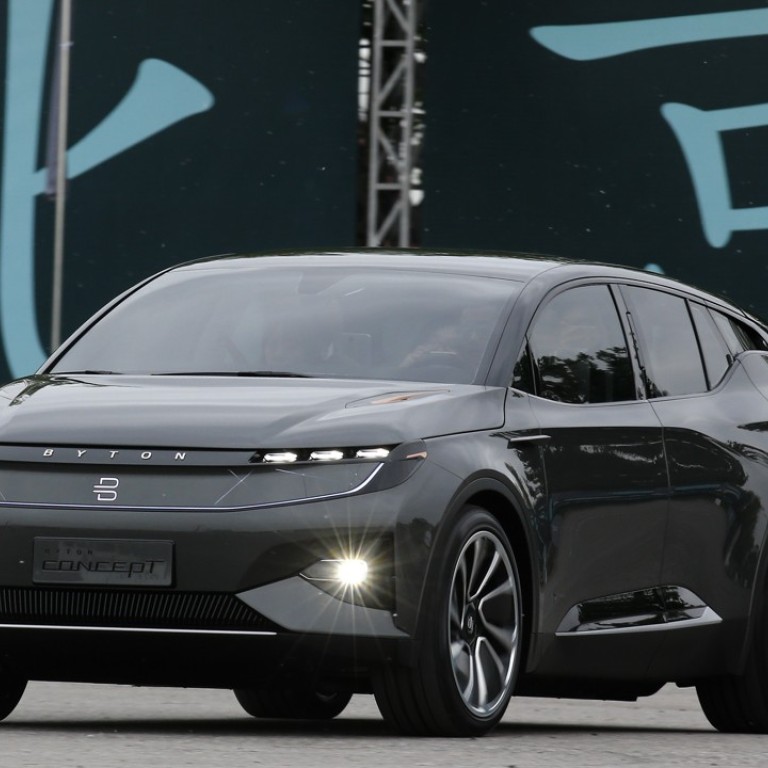
Foreign carmakers could tip their future China plans at Beijing’s auto show this week
International carmakers gathering in Beijing this week for the Auto China 2018 exhibition are likely to face a barrage of questions about their vision for the future following revelations last week that Beijing will phase out rules that prohibit foreign sole ownership in the sector.
The auto show which gets underway on Wednesday will also give local partners and vendors the opportunity to assess the likely long term impact of the liberalisations, analysts said.
Last week, the National Development and Reform Commission announced Beijing would scrap limits on companies making fully electric and plug-in hybrid vehicles this year, do the same for commercial vehicle makers in 2020 and lift restrictions on the wider passenger vehicle market by 2022.
Foreign companies do not fully own their own brands in the Chinese auto market since they are not allowed to hold more than a 50 per cent stake in the joint-ventures with domestic partners.
The deregulation came after festering trade tensions between the United States and China heightened concerns about an all-out trade war.
“The change of this rule allows [foreign carmakers] to know who are the partners who are solid, robust and mutually enriching,” said Carlos Ghosn, the chairman of the Renault-Nissan-Mitsubishi Motors alliance of carmakers, during an April 20 interview in Hong Kong. “Speaking for [ourselves], we selected our Chinese partners because they can give us what we couldn’t do ourselves, and we could give them what they couldn’t do on their own.”
American carmakers GM and Ford are increasing investment in China to expand electric car and battery production.
China reported 28.9 million vehicle sales in 2017, up 3.2 per cent from a year earlier. That followed a 13.7 per cent jump in vehicle sales in 2016 on year.
“The relaxation of foreign ownership limits could weaken the shareholding position of Chinese partners in future joint ventures with foreign companies and create uncertainty for Chinese partners in existing JVs,” Gerwin Ho, Moody’s Investors Service senior analyst said in a research report.
He added that the potential impact is limited in the near term because the current ownership structures in existing JVs are protected by contract.
“We now have a choice, which will make our partnership more solid,” said Ghosn. Renault and Nissan both assemble cars in China with Dongfeng Auto, while Mitsubishi Motors makes cars with Guangzhou Automotive (GAC). “If you can still maintain the partnership in five years’ time [when the foreign ownership caps are lifted], it’s because the relationship is mutually beneficial, not because of a law.”
GM said in a statement that it will continue to work with existing partners to further tap the mainland market.
Beijing has urged auto companies to produce “green cars” with the intention that they account for a fifth of total sales by 2025.
“Auto part suppliers and companies related to the auto industry still want to know whether there are opportunities up and coming,” said Davis Zhang, a senior executive at Suzhou Hazardtex, a fork-lift manufacturer serving manufacturing businesses. “New-energy vehicle plants might be an area to watch since Beijing is tightening requirements for less-polluting cars.”
Beijing has urged auto companies to produce “green cars” with the intention that they account for a fifth of total sales by 2025.
Still, Ho said foreign companies do not have a strong incentive to establish new manufacturing operations since they are already producing pure electric and rechargeable hybrid vehicles in their existing joint ventures.
Last year, Ford signed an agreement with Anhui Zotye Automobile to set up a 5 billion yuan (US$793.7 million) joint venture focusing on electric cars.
Beijing has rolled out various incentives to attract foreign direct investment over the past two years in the form of widened market access to sectors such as entertainment venues including nightclubs, karaoke and sports bars.
However, those liberalisations had minimal impact on the investment appetite of American companies.
American companies invested US$14 billion in mainland China in 2017, nearly unchanged from the US$13.8 billion invested a year earlier, according to consultants Rhodium Group.

